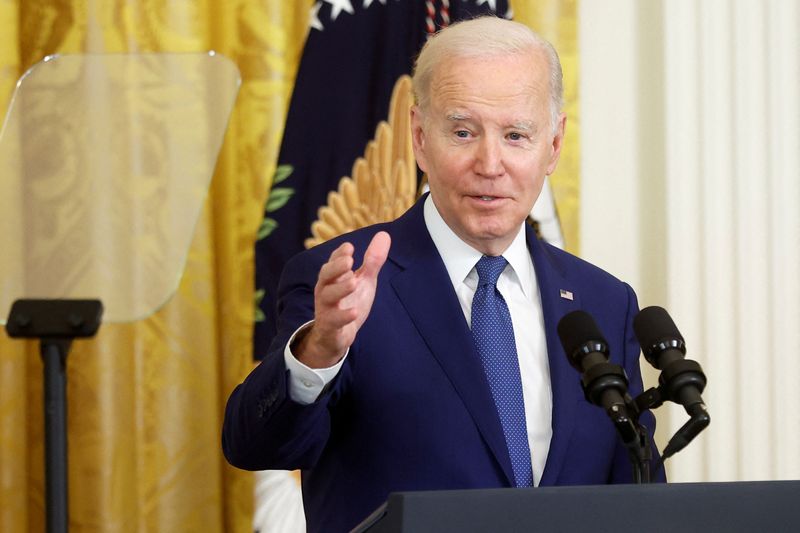By Steve Holland, Arshad Mohammed and Humeyra Pamuk
WASHINGTON (Reuters) - Despite tensions between them, President Joe Biden has so far avoided an acrimonious public confrontation with Israeli Prime Minister Benjamin Netanyahu, while trying to make clear he opposes a judicial overhaul that has shaken the close U.S. ally.
In the last three months, Biden and senior members of his team have expressed alarm about Israeli plans for settlement expansion on the West Bank and about violence between Israelis and Palestinians.
Most troubling for the White House, however, was Netanyahu's plan to reshape the Israeli judiciary system to give the government greater control over appointments to the Supreme Court. The decision propelled Israel into a national crisis with massive protests that forced Netanyahu to delay the move on Monday.
Biden, who has known Netanyahu for about 40 years, has been direct with him in private phone calls, aides say, while publicly expressing support for Israel, the strongest U.S. ally in the Middle East.
"The main operating premise toward this Israeli government is to avoid whenever and wherever they can any sustained public confrontation with Netanyahu," said Aaron David Miller, a Middle East analyst at the Carnegie Endowment for International Peace think tank.
"They don't want a fight. It's bad politics and its bad policy. It's messy and awkward," he said.
U.S. administrations have long been wary of criticizing Israel in part due to the power of pro-Israel lobby groups in Washington, its role as a close ally and the support the country enjoys among ordinary Americans.
The U.S. population largely has favorable views of Israel, home of major religious sites for Christians, Jews and Muslims.
A Gallup poll earlier this month showed that consistent with prior years, Americans view Israel much more favorably than they do the Palestinian Authority, 68% versus 26%.
Emblematic of the Biden approach was a White House statement issued on Sunday night urging "Israeli leaders to find a compromise as soon as possible" as the protests there grew.
"We haven't taken a hands-off approach," said a senior administration official. "We understand that there’s a domestic political process that's playing out. So we’ve been very clear that we have concerns over this reform legislation and we’ve also said very clearly that we want there to be a compromise found. So we’re watching this very closely."
Dennis Ross, a veteran U.S. peace negotiator between Israelis and Arabs, said the Biden administration had expressed its misgivings about Israel’s judicial proposals but had done so privately where possible.
Ross, who is now at the Washington Institute for Near East Policy think tank, said he thought that approach of largely making the case in private was the proper one.
Halie Soifer, chief executive officer of the Jewish Democratic Council of America, said the way the Biden administration has handled this crisis thus far is in keeping with Biden's commitment to the U.S.-Israel partnership.
"And sometimes friends are most honest with each other behind closed doors, and it appears that that is what is happening here," she said.
But, keeping a distance from Netanyahu, Biden has yet to invite him to visit the White House since the Israeli began his sixth term as prime minister in December.
A senior administration official said on Tuesday there is no plan as of yet for Netanyahu to visit but "Israeli leaders have a long tradition of visiting Washington, and Prime Minister Netanyahu will likely visit at some point."
On the other hand, there have been no administration threats to limit U.S. funding to Israel which, according to a March 1 Congressional Research Service report, is the largest cumulative recipient of U.S. foreign assistance since World War II.

There is historically little appetite in the U.S. Congress to take such a step and the United States depends on Israel in a region where Western concerns about Iran have been growing.
(This story has been refiled to fix the title of Halie Soifer in paragraph 14)